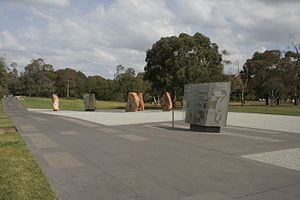
Reconciliation Place
Before we begin our journey of learning in this module, it is important establish an understanding of the concepts of social justice and reconciliation. Your have probably heard of these terms. They are not the same as Human Rights and Protocols for engagement which are addressed elsewhere in this subject. Social Justice and Reconciliation are more concerned with the outcomes of implementing Rights and using effective and respectful engagement strategies. Social Justice and Reconciliation explain why Indigenous Studies is part of your course and is considered important by your profession. These two ideas are based in values that may be held by individuals and promoted in society.
Social Justice is when all citizens are able to take advantage of the benefits and opportunities in society. It argues that the resources of society should be distributed in such a way that those who have certain needs receive extra support, so that the end outcome is an equal playing field. It is not the same as ‘treating everyone equally’.
The aim of Reconciliation is to bring Indigenous and non-Indigenous people together, to acknowledge the past and co-create the present and future. This may mean that those in dominant positions in society have to give up some of their power, position and cultural dominance to make space for Indigenous Australians and Indigenous perspectives.
Ways to achieve these two things include considering Human Rights and Indigenous Rights obligations and using appropriate engagement strategies.
Before we begin our journey of learning in this module, it is important establish an understanding of the concepts of social justice and reconciliation. Your have probably heard of these terms. They are not the same as Human Rights and Protocols for engagement which are addressed elsewhere in this subject. Social Justice and Reconciliation are more concerned with the outcomes of implementing Rights and using effective and respectful engagement strategies. Social Justice and Reconciliation explain why Indigenous Studies is part of your course and is considered important by your profession. These two ideas are based in values that may be held by individuals and promoted in society.
Social Justice is when all citizens are able to take advantage of the benefits and opportunities in society. It argues that the resources of society should be distributed in such a way that those who have certain needs receive extra support, so that the end outcome is an equal playing field. It is not the same as ‘treating everyone equally’.
The aim of Reconciliation is to bring Indigenous and non-Indigenous people together, to acknowledge the past and co-create the present and future. This may mean that those in dominant positions in society have to give up some of their power, position and cultural dominance to make space for Indigenous Australians and Indigenous perspectives.
Ways to achieve these two things include considering Human Rights and Indigenous Rights obligations and using appropriate engagement strategies.
Content is available under the
Creative Commons Attribution Share Alike License.
Privacy Policy | Authors